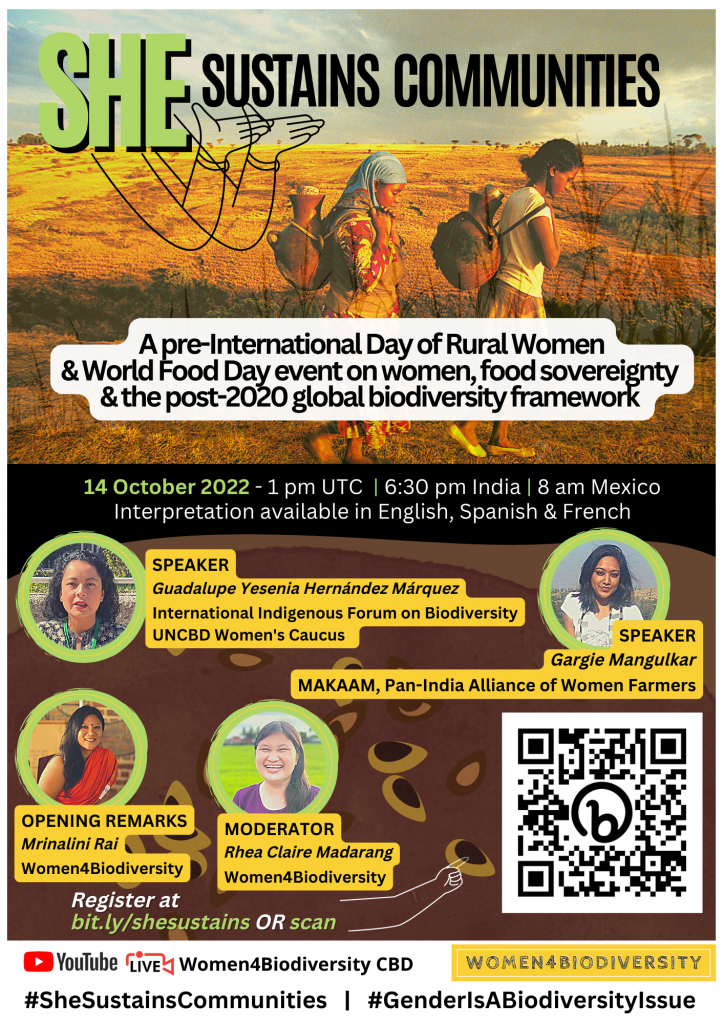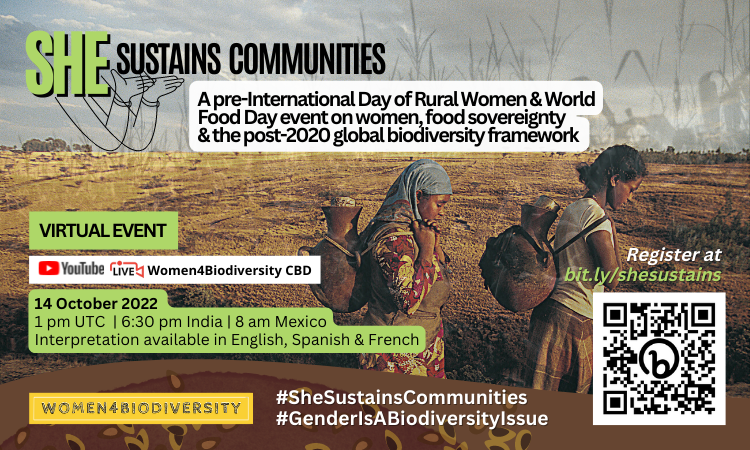Date
14 October 2022
Time
1 pm UTC | 630 pm India | 8 am Mexico
Objectives
1) To gather insights and stories on rural women and their role in food sovereignty through sustainable use of natural resources and biodiversity conservation and restoration
2) To increase awareness on the need for a gender-responsive post-2020 global biodiversity framework for rural women to be truly empowered in ensuring food security for their communities and conserving and restoring ecosystems
Interpretations available
English, Spanish and French
Programme
OPENING REMARKS
Mrinalini Rai
Director, Women4Biodiversity
SPEAKERS
Gargie Mangulkar
National Coordinator, MAKAAM pan-India alliance of women farmers
Guadalupe Yesenia Hernández Márquez
Member, International Indigenous Forum on Biodiversity (IIFB)
Member, Indigenous Women’s Biodiversity Network (IWBN)
MODERATOR
Claire Madarang, Women4Biodiversity

Background/rationale
The International Day of Rural Women (15 October) was established by the UN General Assembly in its resolution 62/136, recognizing “the critical role and contribution of rural women, including indigenous women, in enhancing agricultural and rural development, improving food security and eradicating rural poverty.”
The idea of honouring rural women with a special day was put forward by international NGOs particularly at the Fourth World Conference on Women in Beijing, China in 1995. There, it was suggested that 15 October be celebrated as “World Rural Women’s Day,” on the eve of World Food Day, in order to highlight the role played by rural women in food production and food security.
Their significant roles are shown in Food and Agriculture Organization (FAO) data reporting that women make up 60 to 80 per cent of farmers in non-industrialized countries.
And, rural women do not just contribute to food security, but to food sovereignty as well. FAO also reports that in many African countries, women are responsible for supplying 90 per cent of the domestic water supply, and between 60 to 80 per cent of the production of food consumed and sold by their families. Women contribute 100 per cent of food processing, 80 per cent of food storage and transportation activities, and 90 per cent of the labor involved in preparing the earth before planting.
While food security puts an emphasis on “the availability of food, access to food, the biological use of food, and stability [of the other three elements over time],” according to the FAO, food sovereignty recognizes all the dimensions of a “healthy, ethical and just food system.” The term “food sovereignty” was proposed by an international peasant movement during the 1996 World Food Summit and is built on six pillars, among them a focus on “food for the people,” localized food systems, and food that works with nature.
However, FAO reports that women are less likely to be landowners, and have less access to agricultural resources, technology, and assets. They also work more hours and earn less compared with men. Also, the gender gap in food insecurity is growing, with 31.9 per cent of women moderately or severely food insecure compared with 27.6 per cent of men. The gap in 2021 grew by one per cent compared with the previous year.
These reports show that while women significantly contribute to their communities’ food security and sovereignty, they are disproportionately affected by food insecurity and lack of sovereignty.
This virtual event on Friday, 14 October, on the eve of the International Day of Rural Women and two days prior to World Food Day, will highlight rural women’s roles in sustaining communities and how a truly gender-responsive biodiversity policy will be able to help them attain food security and sovereignty for their families and communities.
With this event, Women4Biodiversity hopes to raise awareness that truly, #SheSustainsCommunities, and that she can effectively do so with enabling conditions like gender-responsive policies.

